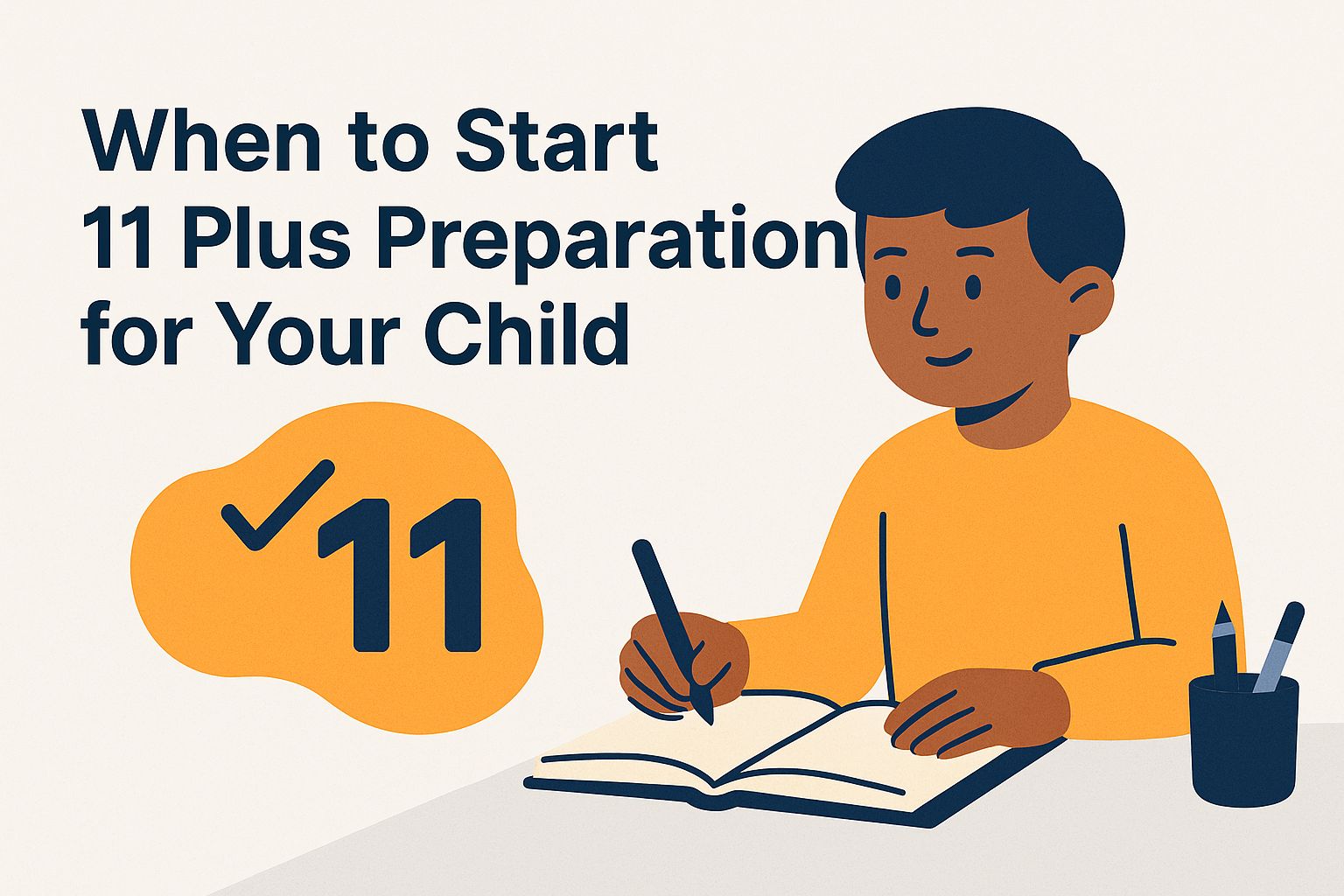
When to Start 11 Plus Preparation for Your Child
Is your child gearing up for the 11 Plus exam? Knowing when to start preparation can set the stage for success — or stress! Parents often wonder when to start 11 plus preparation for your child, and the right timing can make all the difference.
With a thoughtful approach, you can help them build confidence and skills. This guide dives into understanding the exam itself, recognising the best moment to begin, and exploring various preparation methods. Curious about how early is too early and what signs to look for? Let’s uncover the best strategies to support your child’s journey!
What is the 11 Plus Exam?
The 11 Plus exam evaluates a child’s proficiency in English, mathematics, verbal reasoning, and non-verbal reasoning, making it an important factor in school admissions.
This exam comprises various question types across these subjects. For instance, in English, children may be presented with comprehension passages followed by questions designed to assess their understanding.
In mathematics, the exam typically includes problem-solving tasks and arithmetic operations that align with the National Curriculum. Verbal reasoning focuses on vocabulary and logical thinking through exercises involving analogies and sequences, whereas non-verbal reasoning assesses a child’s ability to interpret visual information.
To enhance their preparedness and confidence, it is beneficial for children to familiarise themselves with sample papers and utilise preparatory books.
Importance of Early Preparation
Beginning preparation for the 11 Plus as early as Year 4 can greatly enhance a child’s confidence and improve their chances of achieving a high score. By establishing a structured study timetable six months in advance, children can gradually become familiar with the exam formats, which is essential for reducing anxiety.
For instance, dedicating an hour each week to practising maths problem sets and another hour to comprehension exercises can lead to significant improvements. Research indicates that students who start their preparation early tend to score an average of 15% higher than those who begin later, underscoring the advantages of early engagement.
Understanding the 11 Plus Timeline
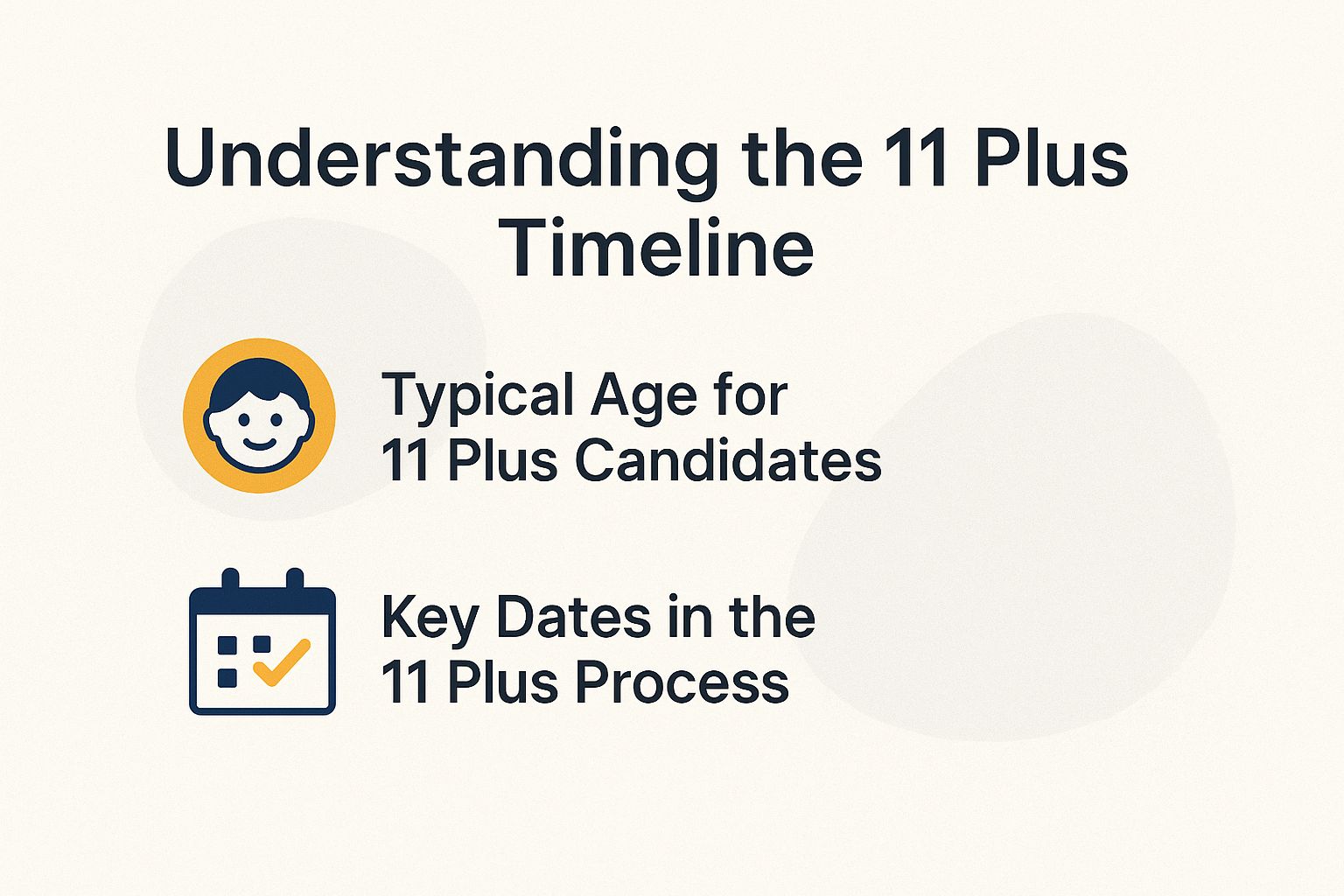
Understanding the timeline for 11 Plus preparation can help both parents and students in effectively navigating the journey towards success. For parents looking to further explore the intricacies of these exams, our parent’s guide to the 11+ exams offers valuable insights into scheduling and preparation strategies.
Typical Age for 11 Plus Candidates
Most students take the 11 Plus exam between the ages of 10 and 11, which coincides with their final year of primary education. This timing is significant, as it aligns with their cognitive development and academic readiness.
At this stage, children generally have the foundational skills in numeracy and literacy necessary to meet the exam’s requirements.
Preparation typically begins in Year 5, providing students with the opportunity to work through practice papers and revision guides such as ‘11 Plus Maths’ and ‘Bond 11 Plus English.’
Parents often seek out tutoring support, utilising resources like online platforms such as Tutorful or local tutoring centres. These resources focus on exam techniques and tailored content, ensuring that students feel confident and well-prepared for their upcoming assessments.
Key Dates in the 11 Plus Process
Key dates in the 11 Plus process typically include registration deadlines, exam dates, and the release of results, all of which are crucial for effective planning.
To manage these important dates efficiently, parents should start by marking the registration deadline, which often occurs in late summer. Next, they should note the exam dates, generally scheduled between September and November.
After the examinations, results are usually released in early December. To help their child stay on track, parents might consider creating a simple calendar that colour-codes each significant date and setting reminders two weeks prior to each event.
This proactive approach can greatly reduce last-minute stress and help both students and parents stay organised throughout the process.
Signs Your Child is Ready to Start Preparation
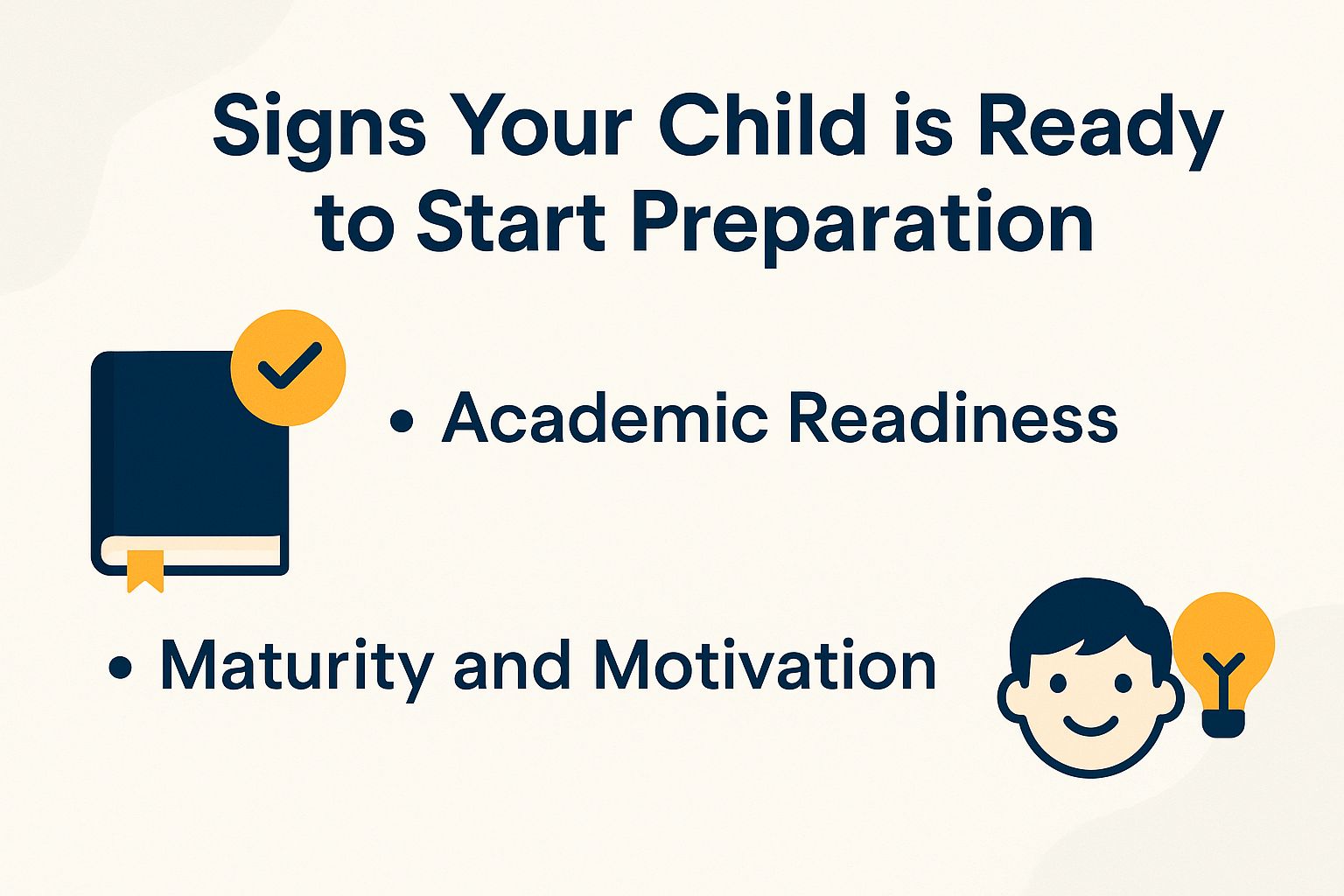
Recognising your child’s readiness for 11 Plus preparation is essential, as it ensures they are adequately equipped both academically and emotionally. Worth exploring: What Should Be in an 11 Plus Study Plan?
Academic Readiness
A strong understanding of core subjects such as English and mathematics serves as a clear indicator of a child’s academic readiness for the 11 Plus exam. To assess this readiness, parents should consider specific benchmarks.
In terms of reading, a child should ideally be performing at or above Level 4 in the National Curriculum, which reflects an ability to comprehend texts aimed at ages 9-10. Regarding mathematics, proficiency in key areas such as fractions, decimals, and basic algebra is essential.
Utilising tools like online practice tests and tutoring sessions can help identify areas where improvement is needed. Additionally, engaging with resources such as past papers or comprehension exercises can provide valuable insight into a child’s capabilities.
Maturity and Motivation
Maturity and intrinsic motivation are crucial factors in a child’s preparation for the 11 Plus, significantly affecting their engagement with study materials. It is important for parents to promote emotional readiness by encouraging resilience and focus in their children.
Regular activities, such as mindfulness exercises, can assist children in managing stress, enabling them to approach their studies with a calm and composed mindset.
Setting achievable goals together, such as completing a specific number of practice questions each week, fosters a sense of accomplishment. It is also beneficial to encourage open discussions about their feelings regarding studying; creating a supportive environment can greatly enhance their intrinsic motivation.
Additionally, utilising tools like motivation journals can help track progress and reinforce positive behaviours.
Optimal Age to Begin Preparation
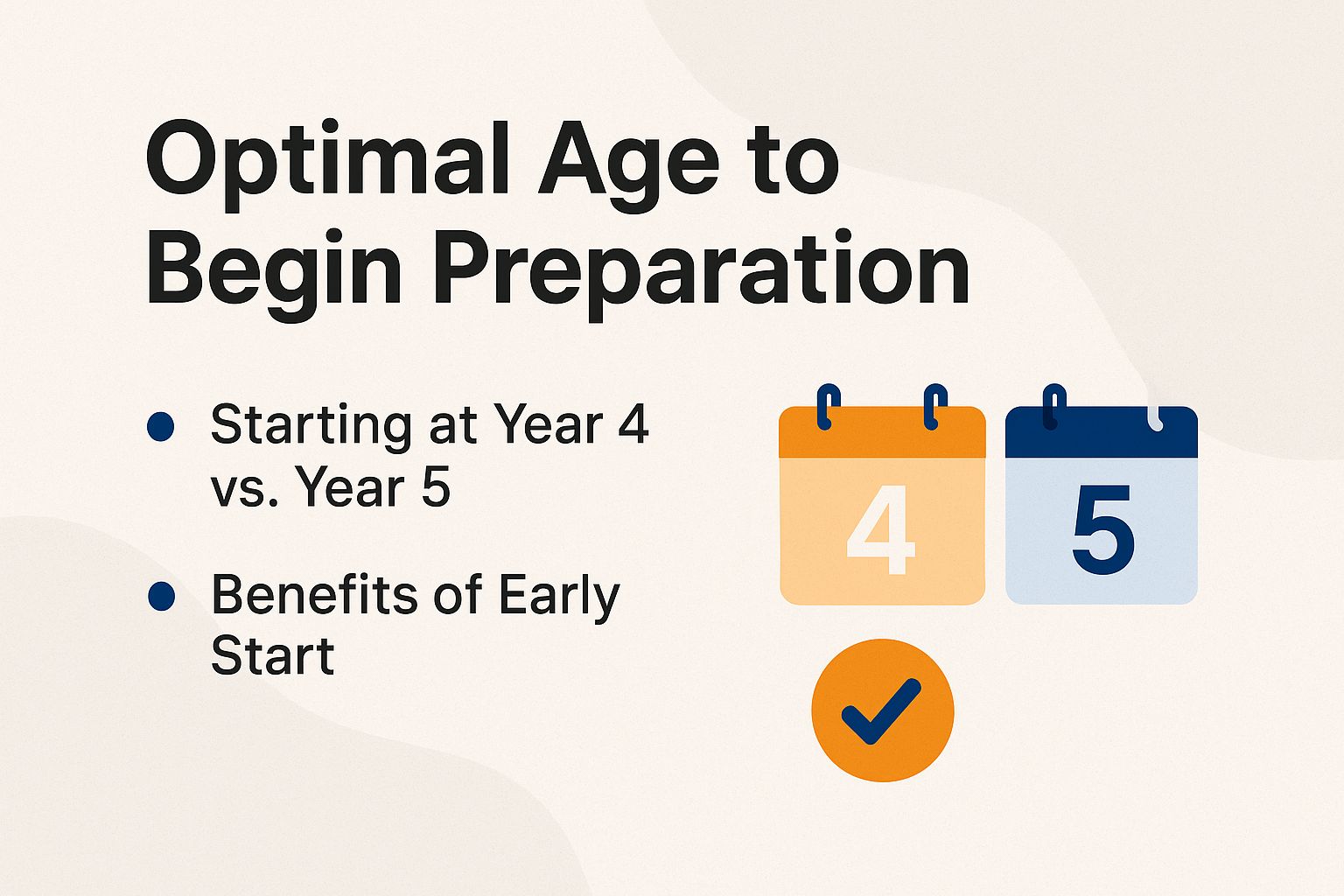
Identifying the ideal age to start 11 Plus preparation can greatly influence a child’s performance and overall readiness on exam day.
It’s important to consider how early preparation can set the stage for success in the examination process.
Starting at Year 4 vs. Year 5
Beginning preparation in Year 4 facilitates a gradual learning process, while Year 5 serves as a more intensive review phase leading up to the exam.
During Year 4, students can take advantage of spaced repetition techniques, such as the Leitner System, which allows them to focus on weaker areas while reinforcing their strengths. By utilising flashcard applications like Anki or Quizlet, they have the opportunity to customise their study materials according to their needs.
In contrast, Year 5 emphasises rigorous mock exams and timed practices, which often lead to noticeable improvements in performance. Research indicates that students who start their preparation early tend to score 15-20% higher on average compared to those who engage in last-minute studying in Year 5.
Thus, starting early not only helps distribute the study workload but also significantly improves overall retention and performance.
Benefits of Early Start
Beginning 11 Plus preparation early can significantly enhance cognitive development and boost confidence levels during exam situations. By initiating your preparation months in advance, you have the opportunity to establish a structured study plan that incorporates daily review sessions, practice tests, and targeted exercises in key subjects such as maths and English.
For instance, utilising resources like the Bond 11 Plus Practice Papers can help students become familiar with various question formats. Additionally, tools like Quizlet can be employed to create effective flashcards for vocabulary building.
This proactive approach not only alleviates stress but also improves knowledge retention, ensuring that students feel well-prepared and confident on the day of the exam.
Types of Preparation Methods
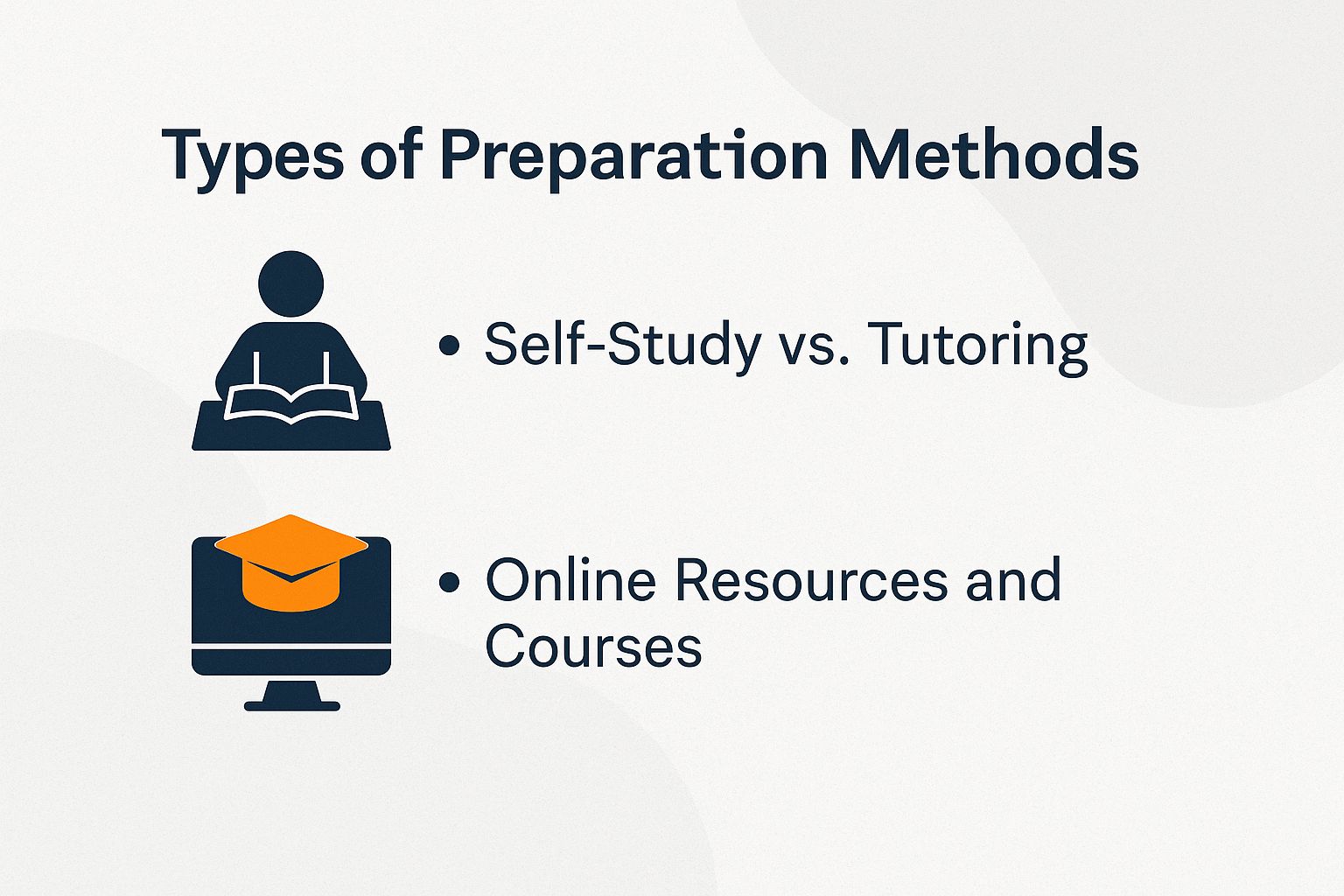
There are several methods available to prepare for the 11 Plus examination, and each of these approaches offers distinct advantages and challenges for students. Curious about when is the best time to start preparing for the 11 Plus exam? Our guide provides valuable insights into planning your study timeline effectively.
Self-Study vs. Tutoring
Self-study allows students to set their own pace, while tutoring provides structured guidance and accountability for those preparing for the 11 Plus.
One of the advantages of self-study is its cost-effectiveness. Many resources, such as online materials and books, are available for free or at minimal expense. In contrast, tutoring sessions typically range from £25 to £60 per hour, which reflects the value of personalised instruction.
While self-study encourages independence, it may not offer the immediate feedback that a tutor can provide. Many students find that a combination of both methods works best.
For example, they can use online platforms like Khan Academy for foundational knowledge and then reinforce their learning through weekly tutoring sessions, which help address specific challenges they may encounter.
Online Resources and Courses
Utilising online resources such as practice papers and interactive courses can greatly enhance a child’s preparation for the 11 Plus exam. It is beneficial to consider platforms like Bond Online, which offer tailored practice papers that enable students to focus on their specific weaknesses while providing instant feedback.
Websites like Eleven Plus Exams are also valuable, as they provide a wealth of free resources, including past papers and forums where students can seek peer support.
For interactive learning, apps like Squirrels Mathematica present engaging activities that help reinforce key concepts in an enjoyable manner.
By combining these tools into a structured study schedule, students can dedicate time for practice tests, revision, and problem-solving, ultimately creating a balanced and effective preparation strategy.
Creating a Study Plan
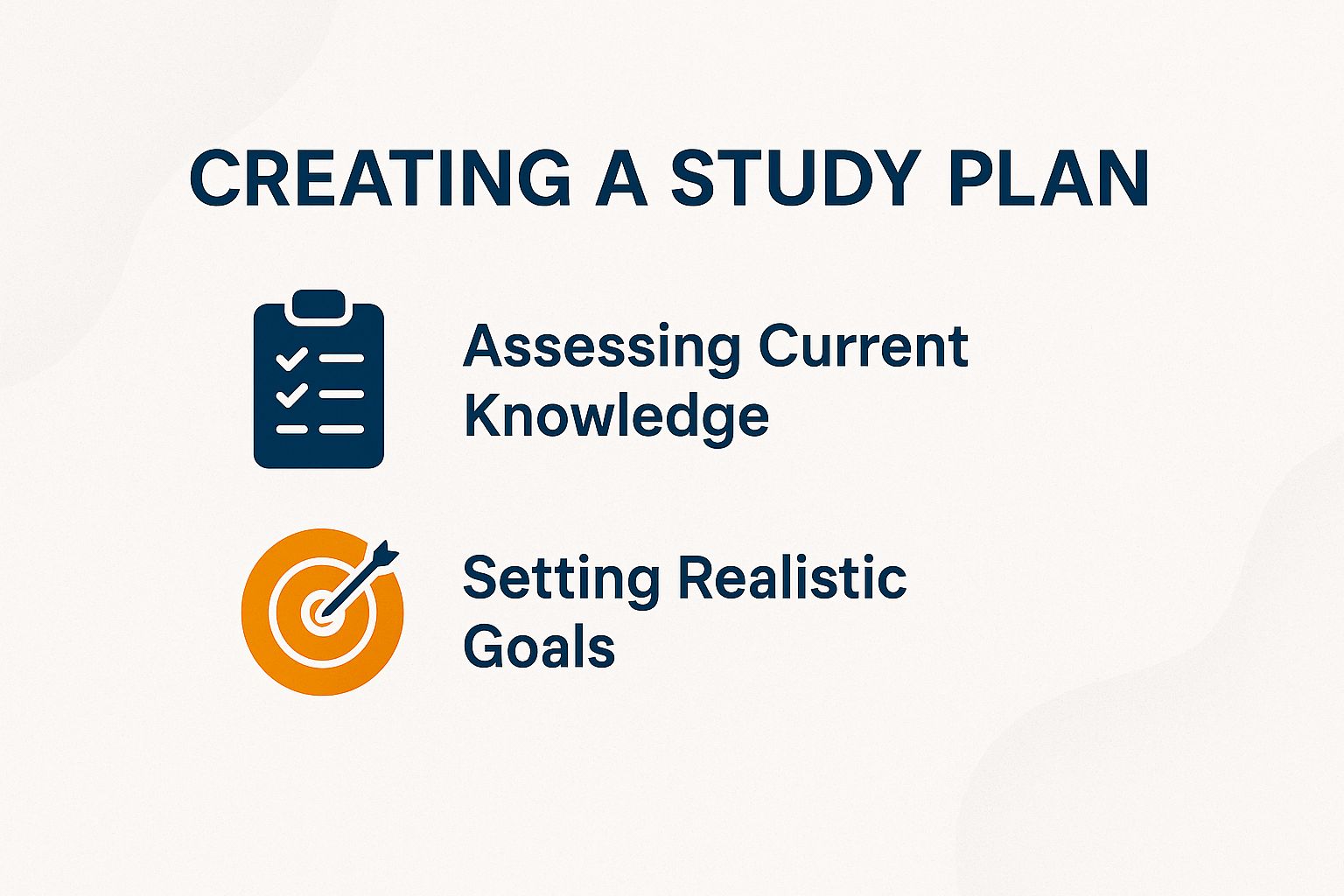
A well-structured study plan designed specifically for your child’s needs can enhance their focus and significantly increase their chances of success in the 11+ exam. To maximize the effectiveness of this plan, explore our detailed guide on creating an 11+ weekly study timetable, which offers strategic insights into planning effective revision at home.
Assessing Current Knowledge
Regular assessments of a child’s current knowledge can be invaluable in identifying strengths and areas that require improvement for the 11 Plus exam. To effectively evaluate your child’s understanding, consider utilising online quizzes from platforms like Khan Academy or IXL, which adjust questions according to specific topics.
Worksheets from websites such as Twinkl and Education.co.uk provide structured practice across various subjects. For a more formal evaluation, standardised tests like the GL Assessment serve as a benchmark for academic skills.
By implementing these methods consistently, you can monitor progress and guide your tutoring efforts, ensuring that your child addresses any gaps in knowledge before the exam.
Setting Realistic Goals
Establishing realistic and achievable goals can significantly enhance a child’s motivation and focus during their preparation for the 11 Plus exam.
To set effective goals, it is beneficial to begin with short-term objectives, such as completing a specific number of practice questions each week. For instance, aiming for 20 maths problems and 15 reading comprehension exercises weekly can provide a clear framework for progress.
Long-term goals should be broader in scope, such as improving overall test scores by a set percentage over the coming months. To maintain motivation, it is important to celebrate small achievements, such as mastering a challenging topic.
Additionally, utilising educational tools from apps like Quizlet can make studying more interactive and engaging.
Regular check-ins can be initiated to assess progress, allowing for adjustments as needed to ensure your child remains engaged and on track.
Monitoring Progress
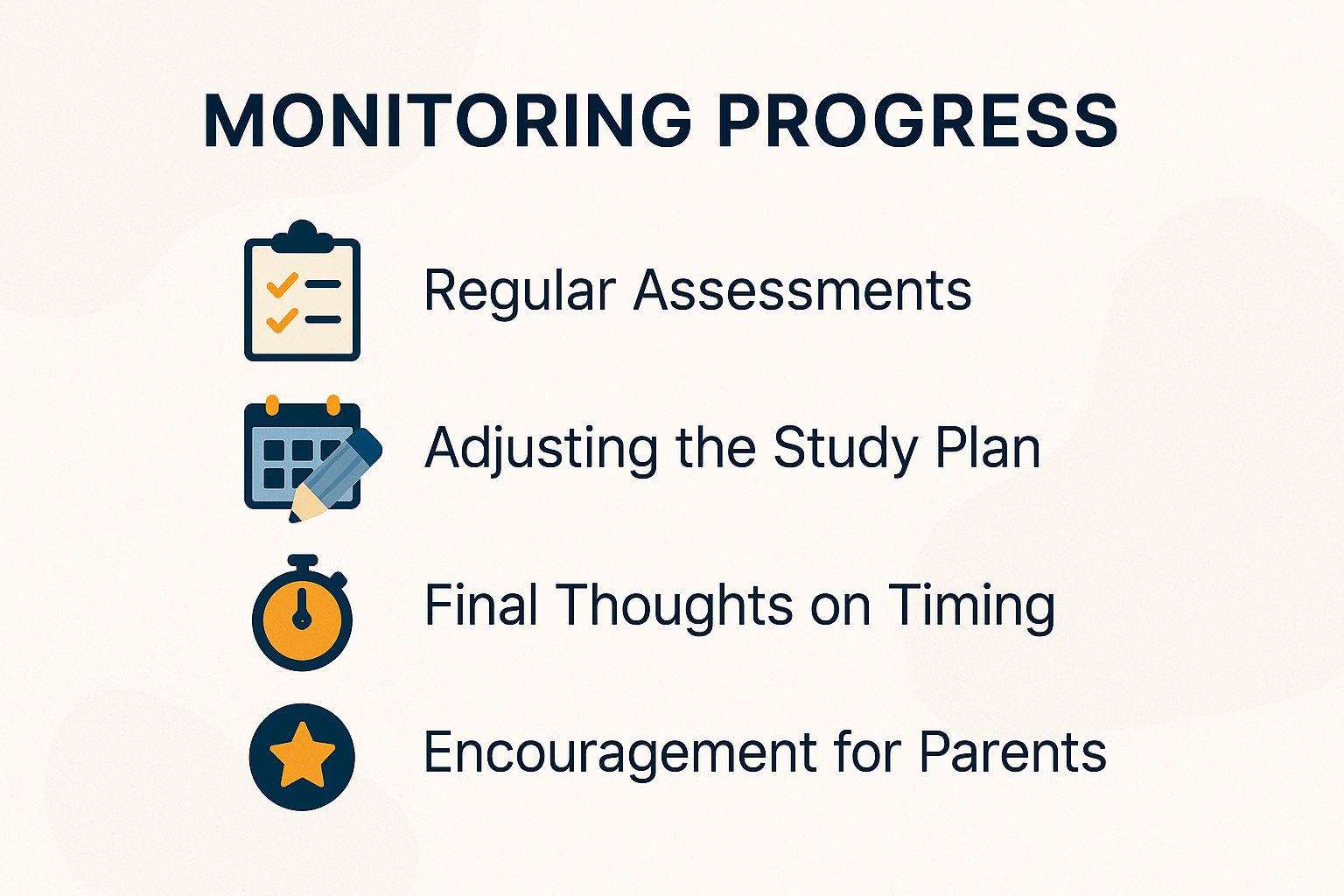
It is important to monitor your child’s progress to ensure they are on track for the 11 Plus exam. This allows for necessary adjustments to their study plan as required.
Regular Assessments
Regular assessments can be quite beneficial as they provide valuable insights into your child’s understanding and identify areas that may require additional focus.
There are various types of assessments that can effectively reinforce learning.
- For example, practice papers are excellent for helping children familiarise themselves with exam formats, while timed quizzes can enhance their time management skills.
Additionally, interactive online platforms such as Khan Academy offer instant feedback and track progress, which can be very helpful.
Verbal assessments also hold significant value; discussing topics can give you a clear sense of comprehension in a more conversational format.
By combining these methods, you can develop a well-rounded evaluation strategy that caters to different learning styles and keeps your child engaged and informed.
Adjusting the Study Plan
Being flexible with your child’s study plan allows you to make necessary adjustments based on their progress and confidence levels. To effectively modify the study plan, it is important to regularly assess your child’s performance through quizzes or practice tests.
For example, if they are experiencing difficulties with maths, you might consider incorporating more interactive resources such as Khan Academy or Mathway for targeted practice. Setting specific goals, like mastering multiplication tables within two weeks, and monitoring their progress on a weekly basis can also be quite effective.
Additionally, maintaining open communication about your child’s interests is beneficial. If they enjoy science, for instance, designing projects around that subject can significantly enhance their engagement. This continuous feedback loop will assist in tailoring their study plan to meet their evolving needs.
Final Thoughts on Timing
The timing of your child’s preparation can greatly affect their performance in the 11 Plus, making careful planning crucial.
Start by evaluating your child’s current academic level—consider using practice tests to identify their strengths and weaknesses. For example, if they find verbal reasoning challenging, dedicate additional time to improving their vocabulary and comprehension skills.
Establish a realistic study schedule; aim for daily sessions of 30 to 45 minutes rather than cramming at the last minute. It can be beneficial to incorporate resources such as past papers and online platforms like Bond Online for interactive practice.
Regularly reviewing progress and adjusting the plan as necessary will help ensure consistent growth and build confidence as the exam approaches.
Encouragement for Parents
Parental support and encouragement play a vital role in helping children navigate the 11 Plus preparation process with confidence. To create a positive study environment, it is beneficial to establish a dedicated study space that is free from distractions.
Utilising tools such as a timer can be effective; for instance, implementing the Pomodoro technique can assist children in managing their time more effectively.
It is important to encourage them through positive reinforcement. Celebrating small achievements with a simple treat or additional playtime can go a long way.
Engaging in their study sessions by reviewing practice questions together not only demonstrates your interest but also provides an opportunity to clarify any doubts they may have.
Additionally, consider scheduling regular check-ins to discuss their progress and goals. This will ensure that they feel supported throughout their journey, making the preparation process more manageable and encouraging.
Additional Resources
A curated list of additional resources can significantly enhance your child’s preparation for the 11 Plus exam. It is worthwhile to consider incorporating the following tools and materials into your study plan.
- First, consider using ‘11 Plus Success’ (£29.99), which offers interactive practice papers that closely simulate actual exam conditions.
- Next, the ‘CEM 11 Plus Practice Papers’ (available for £18.99) provide a comprehensive range of questions tailored specifically to various exam boards.
- Additionally, take advantage of free online platforms like ‘Just Language’ for valuable vocabulary-building exercises.
By combining these resources, you will create a balanced approach to revision, effectively covering comprehension, reasoning, and verbal skills. For those curious about exam formats, exploring our guide on the 11 Plus exam format can provide further insights into tailoring your study plan.
Frequently Asked Questions: When to Start 11 Plus Preparation for Your Child
When should I start preparing my child for the 11 Plus exam?
The ideal time to start preparing your child for the 11 Plus exam is in Year 4 (around the age of 8-9), giving them enough time to build a strong foundation and practice key skills.
Is it too late to start preparing for the 11 Plus exam in Year 6?
While starting earlier is generally recommended, with proper planning and dedication, it is still possible to prepare for the 11 Plus exam in Year 6 and achieve good results.
What are the benefits of starting 11 Plus preparation early?
Starting early allows your child to learn at a comfortable pace, build a strong foundation in key skills, and have enough time for revision and practice. It also reduces stress and pressure closer to the exam date.
How many hours per week should my child spend on 11 Plus preparation?
The recommended study time for 11 Plus preparation is around 1-2 hours per week in Year 4, gradually increasing to 3-4 hours per week in Year 5 and 5-6 hours per week in Year 6. However, every child is different and it is important to find a study schedule that works for them.
What resources are available for 11 Plus preparation?
There are many resources available for 11 Plus preparation, including practice papers, revision books, online courses, and tuition classes. It is important to choose resources that are tailored to your child’s needs and learning style.
How can I support my child’s 11 Plus preparation?
Aside from providing the necessary resources and materials, you can support your child’s 11 Plus preparation by creating a suitable study environment, encouraging them to stay focused and motivated, and providing emotional support. It is also important to have open communication and address any concerns or difficulties your child may have.



